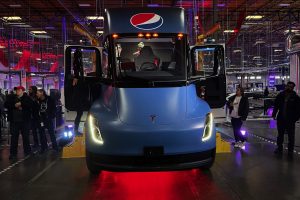Ford has made major progress in its quest to grow its manufacturing capacity for electric vehicles by signing and announcing several deals for the supply of lithium.
Ford has goals to build 2 million electric vehicles every year by 2026, hoping to close the gap with industry leader Tesla, which has dominated the sector due to its manufacturing prowess and evident lead in EV tech and infrastructure.
Ford said on Monday it signed two lithium deals that will help it develop a more stable supply of EV batteries.
Albemarle Corp. signed a five-year agreement with Ford, while Nemaska Lithium agreed to an eleven-year term with the Detroit-based automaker.
The supply deal will see the companies provide Ford with lithium hydroxide, which is a key ingredient in the cathode of lithium-ion batteries.
Albemarle’s deal with Ford will supply the automaker with more than 100,000 metric tons of battery-grade lithium hydroxide, which is enough for approximately 3 million EV batteries.
“With the growing demand for EVs in the United States, our customers are seeking to regionalize their supply chain for greater security, sustainability, and lower costs,” President of Albemarle Energy Storage Eric Norris said. “This agreement exemplifies the industry collaborations and investments required. We’re honored to be entering into this strategic partnership with a legendary automotive manufacturer such as Ford.”
Meanwhile, Nemaska Lithium will provide Ford with 13,000 tons of lithium hydroxide every year.
“We are proud to work with Nemaska Lithium and its partners, Livent and Investissement Québec. The Nemaska Lithium project will be a sustainable source of lithium, supporting Ford’s ability to scale and helping us make EVs more accessible and affordable over time to millions of customers,” Lisa Drake, Ford’s VP of EV Industrialization, said.
Ford has also signed a deal with EnergySource Materials, which will supply lithium from its California refinery that will become operational in 2025. Compass Minerals will also supply lithium carbonate, Reuters said.
Ford has made many strides this year to solidify its EV supply chain, especially for battery minerals, as it continues to grow production in hopes of catching up to Tesla.
Ford signed deals with PT Vale Indonesia and China’s Zhejiang Huayou Cobalt as a partner in its $4.5 billion nickel processing plant. This deal happened in March and gives “Ford direct control to source the nickel we need,” Drake said when the deal was announced.
Ford will host an Investor Day event later today, where it will detail its plans for EV expansion. Ford will continue to lose money on its EV unit until it reaches a level of scalability that will offset its manufacturing costs.
The ongoing EV price war has certainly not helped the cause either, as Ford has been forced to adjust prices to remain competitive.





